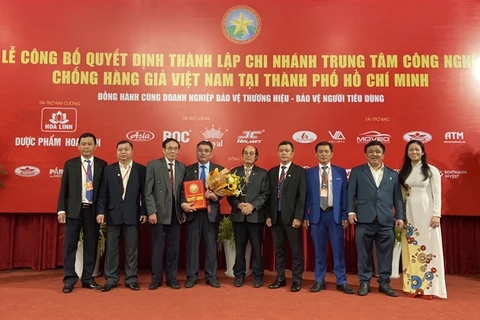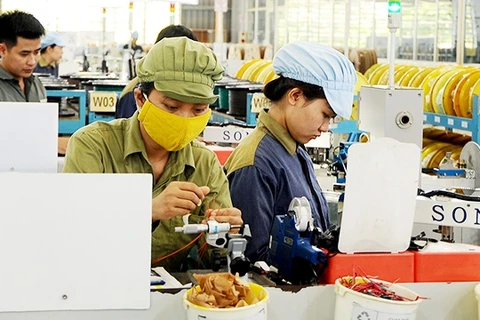Hanoi (VNS/VNA) - The shortage of electronic chips is causing difficulties for businesses and electronics manufacturers as chipsets are used in most electronic products and technological devices.
Dao Phan Long, Chairman of the Vietnam Association of Mechanical Industry (VAMI), said the chip shortage was causing many businesses production problems.
Not only was there a shortage of goods, but delivery times had also become much longer. Many enterprises producing electronic equipment and technology in Vietnam have suffered the impact of the global chip crisis, noted Long.
A technology expert from Appota shared that chipsets or microprocessors appear in many products, from electronic cards to other devices such as televisions, refrigerators, cameras, and cars.
However, few Vietnamese enterprises can make a chip from start to finish, including research, design and production, said the expert.
All products must be imported from other countries, mainly China, which means domestic electronics and technology manufacturing enterprises have been affected by the global chip crisis.
In domestic automobile production, Ninh Huu Chan, General Secretary of the Vietnam Automobile Manufacturers' Association (VAMA), said the shortage of chips would mean fewer cars would be put on the market and their price might increase soon, especially imported cars.
This shortage would likely carry on until the end of this year and even into next year, he added.
Experts said that the global shortage of processor chips was due to the growing demand for smartphones, computers and other electronic devices during the COVID-19 pandemic, along with the technology-related trade tension between the US and China.
Amid the pandemic, along with the shortage of containers, and high transportation costs, the lack of processing chips for production has put pressure on manufacturing enterprises, said Chan.
Chip manufacturing requires a high level of sophistication and technology, large investment capital and time to build and install equipment, he added.
Long said the cost to build a factory to produce processing chips could cost up to tens of billions of dollars and few companies could compete with the likes of Intel and Samsung.
The accuracy and quality of the chips also have very strict requirements, he added.
To cope with this situation, domestic electronic equipment and technology firms have had to consider diversifying their supply, said Tran Viet Hai, general director of BKAV Electronics.
To overcome difficulties, businesses needed to find alternative sources of raw materials and expand supply networks, said a representative of the Hanoi Supporting Industry Business Association. It was necessary to be proactive in research, development and use of more popular and flexible components and chipsets.
Nguyen Anh Tuan, Chairman of the Ho Chi Minh City Semiconductor Industry Association, said the chip crisis was having a stronger impact on large, foreign-invested manufacturers such as Samsung and Intel as opposed to those in the field of semiconductors and electronics in Vietnam.
The member enterprises of the association were mostly small and medium-sized, with a small number of chips used, so they could flexibly manage, find a source of reserve chips or switch to collecting goods from small manufacturers, Tuan said.
Currently, chip and wafer (a thin slice of semiconductor) factories were focusing on workers to run at full capacity, so the possibility of this shortage crisis would not last beyond next year.
The Nguoi Lao Dong (The Labourer) newspaper quoted Tuan as saying that however, rising chip prices would have a direct impact on the production and business efficiency of many Vietnamese enterprises.
He also noted that most Vietnamese technology enterprises could process chip designs, but could not produce a complete chip. In the long term, investing in domestic chip production was the fundamental solution to reduce dependence on imported goods, although this was a very long and difficult road to go down.
A few pioneering enterprises in the technology field of Vietnam have initially produced chips, from production to market, but their scale is limited and their output is still modest.
For example, Dien Quang Lamp JSC was the first unit in Vietnam to produce SMD LED chips with capacities of 0.2W, 0.5W, and 1W, enough to meet the needs of LED products for both domestic and export markets.
Dien Quang is promoting investment in synchronous production lines of international standards, with LED chip production lines, electronic boards and other products./.
Dao Phan Long, Chairman of the Vietnam Association of Mechanical Industry (VAMI), said the chip shortage was causing many businesses production problems.
Not only was there a shortage of goods, but delivery times had also become much longer. Many enterprises producing electronic equipment and technology in Vietnam have suffered the impact of the global chip crisis, noted Long.
A technology expert from Appota shared that chipsets or microprocessors appear in many products, from electronic cards to other devices such as televisions, refrigerators, cameras, and cars.
However, few Vietnamese enterprises can make a chip from start to finish, including research, design and production, said the expert.
All products must be imported from other countries, mainly China, which means domestic electronics and technology manufacturing enterprises have been affected by the global chip crisis.
In domestic automobile production, Ninh Huu Chan, General Secretary of the Vietnam Automobile Manufacturers' Association (VAMA), said the shortage of chips would mean fewer cars would be put on the market and their price might increase soon, especially imported cars.
This shortage would likely carry on until the end of this year and even into next year, he added.
Experts said that the global shortage of processor chips was due to the growing demand for smartphones, computers and other electronic devices during the COVID-19 pandemic, along with the technology-related trade tension between the US and China.
Amid the pandemic, along with the shortage of containers, and high transportation costs, the lack of processing chips for production has put pressure on manufacturing enterprises, said Chan.
Chip manufacturing requires a high level of sophistication and technology, large investment capital and time to build and install equipment, he added.
Long said the cost to build a factory to produce processing chips could cost up to tens of billions of dollars and few companies could compete with the likes of Intel and Samsung.
The accuracy and quality of the chips also have very strict requirements, he added.
To cope with this situation, domestic electronic equipment and technology firms have had to consider diversifying their supply, said Tran Viet Hai, general director of BKAV Electronics.
To overcome difficulties, businesses needed to find alternative sources of raw materials and expand supply networks, said a representative of the Hanoi Supporting Industry Business Association. It was necessary to be proactive in research, development and use of more popular and flexible components and chipsets.
Nguyen Anh Tuan, Chairman of the Ho Chi Minh City Semiconductor Industry Association, said the chip crisis was having a stronger impact on large, foreign-invested manufacturers such as Samsung and Intel as opposed to those in the field of semiconductors and electronics in Vietnam.
The member enterprises of the association were mostly small and medium-sized, with a small number of chips used, so they could flexibly manage, find a source of reserve chips or switch to collecting goods from small manufacturers, Tuan said.
Currently, chip and wafer (a thin slice of semiconductor) factories were focusing on workers to run at full capacity, so the possibility of this shortage crisis would not last beyond next year.
The Nguoi Lao Dong (The Labourer) newspaper quoted Tuan as saying that however, rising chip prices would have a direct impact on the production and business efficiency of many Vietnamese enterprises.
He also noted that most Vietnamese technology enterprises could process chip designs, but could not produce a complete chip. In the long term, investing in domestic chip production was the fundamental solution to reduce dependence on imported goods, although this was a very long and difficult road to go down.
A few pioneering enterprises in the technology field of Vietnam have initially produced chips, from production to market, but their scale is limited and their output is still modest.
For example, Dien Quang Lamp JSC was the first unit in Vietnam to produce SMD LED chips with capacities of 0.2W, 0.5W, and 1W, enough to meet the needs of LED products for both domestic and export markets.
Dien Quang is promoting investment in synchronous production lines of international standards, with LED chip production lines, electronic boards and other products./.
VNA
























